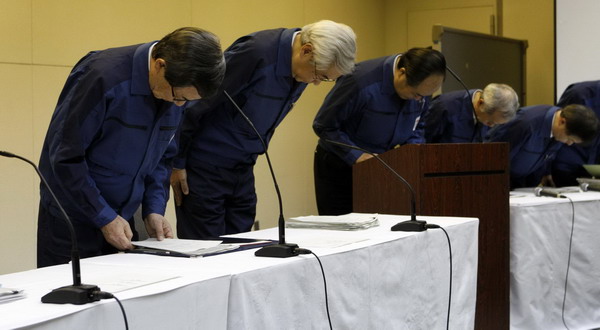Nuclear Meltdown
Evacuees slam Japan nuclear plant operator
(Agencies)
Updated: 2011-04-13 17:23
 |
Large Medium Small |
|
 Tokyo Electric Power Co, (TEPCO) President Masataka Shimizu (L), Executive Vice President Sakae Muto (2nd L) and company officials bow at the start of a news conference at TEPCO headquarters in Tokyo April 13, 2011. [Photo/Agencies]
|
|
||||
The protest by about 20 small business owners from communities near the plant reflects growing public frustration with Tokyo Electric Power Co.'s handling of the nuclear crisis that erupted when a tsunami triggered by a magnitude 9.0 earthquake on March 11 wrecked its cooling systems and backup generators.
TEPCO's president, Masataka Shimizu, and other company executives bowed in apology, once again, on Wednesday, after Shimizu pledged to do more to help compensate residents unable to return home or work due to the accident.
Cash payments are being "readied as soon as possible," Shimizu said.
He said the company "will do our utmost" to get the plant's reactors under control and curb radiation leaks that prompted the government to revise its rating of the incident to the worst possible, on a par with the 1986 Chernobyl disaster.
TEPCO manager Kensuke Takeuchi told Konno and the other protesters the company was not yet prepared to give any money, but he promised to convey their demands to higher level management.
"You are eating a warm meal every day," said Konno, complaining that the two pieces of bread provided at the evacuation center where he is staying were not fit to be fed to dogs.
"I am not asking for anything more than I am entitled to. I just want my due," said Ichijiro Ishikawa, 69, a construction worker who lived eight miles (13 kilometers) from the plant.
Japan's leaders are urging a return to normality, with Prime Minister Naoto Kan exhorting the public Tuesday in a televised address to build an "even more marvelous country."
Work on repairing damage at the plant and ending radiation leaks has been impeded by aftershocks, fires, explosions and other glitches in the improvised efforts to restore its cooling systems.
Nuclear safety officials and TEPCO reported no major changes Wednesday, a day after the government ranked the accident there at the highest possible severity, 7, on an international scale.
The higher rating was open recognition that the nuclear crisis has become the second-worst in history after the catastrophe in Chernobyl, but it did not signal a worsening of the plant's status in recent days or any new health dangers.
| 分享按鈕 |

